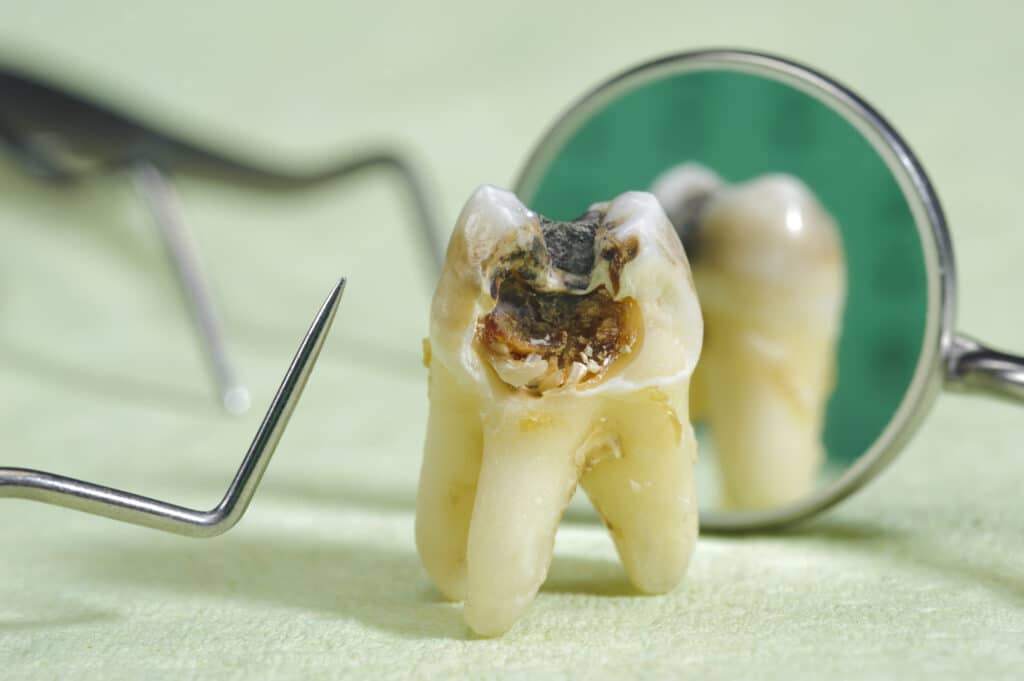
Although many people understand that poor oral hygiene can lead to tooth decay, people can still develop cavities if they brush their teeth daily. Cavities (also known as tooth decay or dental caries) result from many factors, including harmful bacteria in the mouth, bad habits, and more. Here are three surprising culprits of cavities:
1. Diet
Many people believe in the proverb, “you are what you eat.” This famous saying can apply to the integrity of the teeth. While it’s widely understood that excessive sugar consumption can lead to cavities, diets with more carbohydrates and acidic foods can also induce tooth decay.
High-Carb Diet
Cavity-causing bacteria thrive on more than just sugar. Any food or drink that contains fermentable carbohydrates can support cavity-causing bacteria. Fermentable carbohydrates decompose into sugars while still inside the mouth and include sugary and starchy foods and beverages.
Furthermore, it’s important to note that fermentable carbs that stick around (such as sugary drinks, dried fruits, and sticky candies) destroy the enamel more than foods that are cleared out of the mouth quickly. After enjoying sugary or starchy foods that linger, it is essential to brush and floss teeth immediately afterward to help prevent dental decay.
Acidic Food and Beverages
If you are keen on eating or drinking citrusy, sour, or carbonated things, limit how much you consume. Why? Food and drinks high in acids erode the protective surface of the teeth (enamel). When dental erosion occurs, patients may experience a shift in appearance and strength, which makes them more susceptible to germs that increase the risk of tooth decay.
2. Dry Mouth
Saliva is an essential substance that the body naturally produces to digest food and sustain strong teeth properly. Furthermore, saliva provides minerals and proteins that protect the enamel and decrease the likelihood of cavities. However, some people who participate in activities or habits that may cause dry mouth, including:
- Aging: As people age, many experience dry mouth. Some contributing factors include long-term health problems, insufficient nutrition, and changes in the body’s metabolic processes.
- Recreational drug, tobacco, and alcohol use: Some drugs (such as methamphetamine and marijuana), tobacco, and alcohol are associated with increased dry mouth symptoms.
- Snoring and mouth breathing: When people breathe more frequently through their mouths (instead of their noses), saliva flow slows down as their mouths begin to dry out.
As the mouth becomes drier and drier, it becomes an acidic environment. A pH imbalanced mouth facilitates the development of cavities because the harmful bacteria and plaque that corrode teeth cannot be washed away.
3. Gum Recession
Have you noticed your gums pulling away from your teeth? This common yet disastrous phenomenon is defined as “gum recession.” There are several reasons why gums recede, including:
- Aggressive tooth brushing
- Inadequate dental care
- Gum disease
- Genetics
As gums withdraw from the teeth, the tooth root becomes more exposed. Unlike the rest of the tooth, the tooth root does not have a protective enamel covering. The tooth root is defenseless to tooth decay-causing bacteria.
Prevent and Treat Cavities with Gentle Laser Dentistry
Some people avoid cavity treatment and preventative dental visits because traditional dental drills can be haunting. However, Dr. Helen Ragsdale offers gentle, contemporary laser dentistry technology to detect cavities and treat them safely and precisely. Schedule an appointment online or call us at (512) 346-4690 to meet our dedicated team at Austin Laser Dentist.
